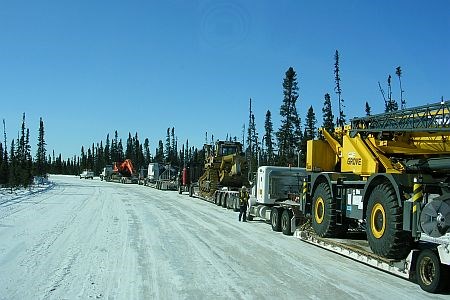THUNDER BAY – Poor winter road conditions throughout the north are becoming a growing concern for remote First Nation communities that rely on the seasonal transportation network to bring in crucial supplies.
“It’s becoming more and more concerning,” said Nishnawbe Aski Nation Grand Chief, Alvin Fiddler. “Now that we are at the end of January, the fact that many of our communities still can’t haul big loads, so fuel or other supplies to the communities, is something we need to raise now with both Ontario and Canada.”
Work on winter roads normally begins in November and December, with trucks transporting full loads by mid to late January.
“This year they are not even close,” Fiddler said. “Some communities need another 12 inches of ice before they can haul full loads of fuel to their communities.”
Many communities that use diesel generators for power rely on the winter roads for fuel shipments. If the shipments cannot be transported by truck, they will need to be brought in by air, which will have significant financial impacts, Fiddler said.
“Many communities are running out of fuel,” he added. “If they can’t haul it in by winter road soon, they will have to fly it in. That is probably three times more expensive than it would be hauling it on the winter road. So they will have to absorb that cost somehow.”
Other communities also rely on winter roads to transport materials into the community for construction projects like schools and health centres.
“If they cannot mobilize the materials and equipment they need to construct these facilities, it will delay the construction of these projects, which will mean added costs if they have to fly it in for example or wait another year to haul in all the materials,” Fiddler said.
This has been a growing concern for the past several years, Fiddler said, and high water levels last fall are adding to the challenging conditions.
“The ice is not thick enough,” he said. “The creeks are not freezing up, so they are having a hard time to build the ice and even plowing the road is becoming a huge concern.”
With the changing environment, conditions could become even worse in the years to come, which is why some communities are looking for a permanent solution.
“Many of our communities, including Marten Falls and Muskrat Dam and others are looking at building all season roads in the future to connect to the communities in the NAN territory,” Fiddler said. “Knowing that winter roads are becoming more and more unreliable and unsafe.”
